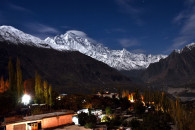Council of experts, academicians concerned over institutional friction
Call for seeking better ways to evolve national unity, find homegrown solutions

Call for seeking better ways to evolve national unity, find homegrown solutions. PHOTO: FILE
This was stated by the National Academic Council (NAC) of the Institute for Policy Studies (IPS) in a meeting of the council on Wednesday.
Professor Khurshid Ahmad, a former senator and IPS chairman, urged the need for finding ways to foster and bolster national unity. “Pakistan is the result of a democratic struggle and this is still very much the way to take the country forward” Ahmad said .
With the country facing stern challenges today, finding a way out of these crises was only possible when individuals, as well as institutions, play their part and make concerted efforts in this regard, Professor Ahmad added.
He suggested that all stakeholders should keep the national interests at the forefront while devising national decisions and policies and to understand the ground realities. The veteran scholar pointed towards the protection of Pakistan’s ideological identity, safeguarding its independence, self-reliance and public welfare as some of the areas around which the framework of national policies should be built.
Pakistan Shariat Council Secretary General Maulana Zahidul Rashdi and Air Commodore (retd) Khalid Iqbal, along with Riphah International University vice-chancellor Professor Dr Anis Ahmad, also expressed their concerns over segmentations including social, regional, political, cultural and sectarian divide.
They urged the need for taking measures to instil harmony among the different factions of the nation.
Planning Commission’s former deputy chairman Saeed Ahmed Qureshi and former additional secretary Riyazul Haque were critical of the current economic policies adopted by the country. Qureshi pressed for revising free-trade agreements which Islamabad had recently signed with different countries, expressing his apprehension that such agreements were useful for a country only when there exists some sort of trade balance among the concerned parties.
Former chief economist at the Planning Commission Fasih Uddin and University of Management and Technology (UMT Rector Dr Hasan Sohaib Murad stressed on the need for developing homegrown scientists –in the fields of social and technological sciences – by allocating sufficient funds and resources, to find solutions to problems indigenously.
Ruet-e Hilal Committee Chairman Mufti Muneebur Rehman highlighted the negative role which media plays by only painting a picture of despair and gloom in the country rather than fostering nation-building and promote national narratives. He also directed attention towards the fast declining moral standards of society.
Published in The Express Tribune, October 12th, 2017.



















COMMENTS
Comments are moderated and generally will be posted if they are on-topic and not abusive.
For more information, please see our Comments FAQ